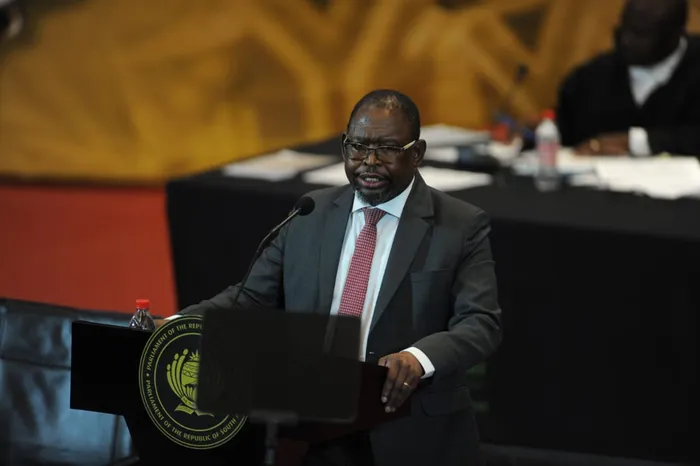Decisive leadership key to fixing budget challenges

Picture: Phando Jikelo / African News Agency ( ANA) / February 2023 – Minister of Finance Enoch Godongwana. National Treasury must be congratulated for introducing a municipal debt relief programme, the writers say.
By Sue Bannister and Michael Sutcliffe
The minister of Finance’s Medium-Term Budget Policy Statement (MTBPS) was delivered during a time of severe fiscal constraint. Despite some negative comments, there are many positive initiatives.
They range from short-term strategies to increase tax collections and reform the social wage system, to initiatives focusing on immediate challenges, but which also have longer term implications. In this regard, there can be no doubt that we must work to address logistics, infrastructure, crime, poverty, inequality and other delineated areas if we are to move out of the debt trap since 2008.
We must base our approach on evidence, which should be one of all society. We should be wary of generalisations, such as claims that local government is dysfunctional, and rather focus on those elements of local or other government divisions that need specific action. Much has been said about certain areas in the MTBPS such as the fiscal outlook, consolidation and economic growth prospects.
Relatively few commentators, however, have focused on those specifics mentioned in the speech affecting where people live and work, including broader areas of infrastructure and procurement.
In terms of municipalities, National Treasury must be congratulated for introducing a municipal debt relief programme. Our experience in eThekwini has shown that such programmes are successful as long as conditions are strictly applied. In eThekwini we started a programme of writing off debts as long as consumers kept up payment on their current accounts. If they did, we would write their debt off over a 48-month period.
Such approaches make sense because they address the reality that if bills are not paid over more than 90 days, they are unlikely to be repaid at all. More importantly, building a culture of payment compliance lays the basis for higher financial collection ratios.
The minister’s focus, particularly on water and wastewater (sanitation) is also welcome, although he could have also included roads, stormwater, public transport and other basic network services. These must be seen as the major economic and social aspects of building human settlements, and if done properly will address many of the environmental challenges faced, as we build a more sustainable human settlements system.
The important initiative to create a fund for disasters for example, should also be used with the condition that rebuilding is conducted in better and more sustainable ways, rather than simply by rebuilding in old ways.
However, there is a need to reverse a very concerning trend in budgetary and expenditure patterns in municipalities. At a macro level these may be summarised as follows, comparing aggregate 2012/13 with 2022/23 adjustment budgets and expenditure patterns:
- We must improve budgeting and spending levels in municipalities: In 2012/13 the adjusted total municipal budgets were R288,3 billion compared to R567.3 billion in 2022/23, but importantly in 2012/13 approximately R35 billion remained unspent, and this has grown to R71.4 billion in 2022/23. There may be a variety of reasons for these unspent budgets, but poor budgeting, reduced collections and poor management are often key factors behind this.
- We must reverse the decline in the ratio of operational to capital expenditure: Over the past 10 years we have seen a significant proportionate decline in capital expenditure across municipalities: for example, in 2012/13 19 percent of the aggregate expenditure was on capital projects, but by 2022/23 this had declined to only 12 percent being spent on capital projects. This has meant that less infrastructure is being developed.
- At an operational level, repairs and maintenance expenditure patterns have remained low and, in many cases, declined. This is an important factor behind water losses, electricity outages, sewerage spills and so on.
- One negative trend is under-expenditure of operational budgets for many of the basic services. For example, looking at the operational expenditure for water and sanitation, in 2012/13 R2.3 billion was unspent, and by 2022/23 this figure rose to R9.2 billion. In the case of electricity, the figures are even more startling; with R5.4 billion of operational funds being unspent in 2012/13 as compared with R15.4 billion in 2022/23.
Solutions to poor budgeting, expenditure and implementation need a more specific analysis of each municipality. They include improving leadership, particularly at an administrative level, improving consequence management, and including support provided to reverse these trends.
While billions are spent on financial management, for example, the number of financially distressed municipalities continues to grow.
Recommendations around the establishment of an infrastructure finance and implementation support agency are to be welcomed. However, care must be taken to ensure that such an approach is outcomes-based and not conducted on the uninformed belief that the private sector always delivers more efficiently, effectively, or economically.
Our own experience in eThekwini during the FIFA World Cup period allowed us to compare the cost of internal versus external engineering professionals, and we found that having highly experienced practising engineers working in our municipality were more than five times cheaper than using consultants doing the same work.
The government, however, does require support for more specialised work. Care must also be taken that public-private partnership approaches do not result in expensive infrastructure and increased costs going forward.
Finally, over-regulation of development processes in general and procurement in particular, remains a great challenge. We hope that the Procurement Bill simplifies procurement and addresses the real problems in our supply chain processes.
Corruption, incompetence, and inefficient processes remain rife in procurement, and unless there is greater transparency and simplified appeals processes by independent bodies, we will not reduce corruption.
The root of this is a lack of transparency and responsiveness in government and entities which, when coupled with little or no consequence management, results in poor public perceptions, protests and the like.
Sue Bannister and Michael Sutcliffe are Directors at City Insight.